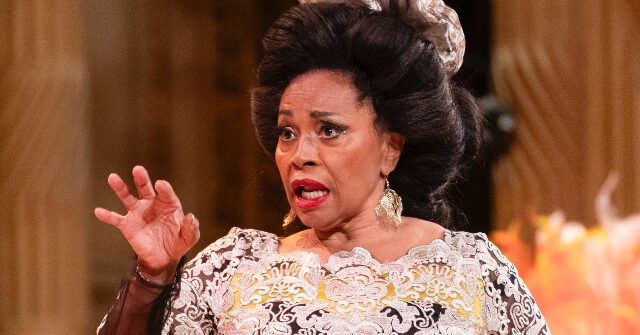In a recent interview with ESPN’s Stephen A. Smith, Hollywood actress Jenifer Lewis, known for her role in the ABC sitcom “Black-ish,” expressed her discontent with black and Latino men who did not support Kamala Harris in the presidential election. Lewis described Harris as a “joyful” candidate, making her disappointment apparent as she accused these men of sexism and a desire to maintain traditional gender roles. Throughout her passionate rant, Lewis emphasized Harris’s qualifications, claiming that these men overlooked her strengths—intelligence, power, beauty, and kindness—simply because she is a woman. She argued that this dismissal reflects a broader issue regarding how women, especially those in power, are often perceived within certain communities.
In her vehement criticism, Lewis suggested that the choice of some black men to vote for Donald Trump instead of Harris was rooted in self-hatred. She claimed that they were attracted to Trump’s perceived power and the idea that he would elevate their status or wealth. According to Lewis, these men opted for “the man,” identifying with Trump’s masculine persona over a qualified woman leader. This sentiment taps into deeper societal issues surrounding race, gender, and the historical context of male leadership within the African American and Latino communities.
Lewis’s remarks escalated when she made alarming claims about Trump’s intentions, alleging that he would use military force against black men. Her outburst indicated a profound fear over the implications of a Trump presidency for marginalized communities. This perspective reflects a sense of urgency and concern about the potential dangers posed by the administration, particularly for African Americans. Lewis’s fervent language suggested that she believed the political ramifications could significantly affect future generations.
This isn’t Lewis’s first vocal outcry regarding Trump’s presidency. Earlier in the year, she appeared on SiriusXM and made a dramatic comparison between Trump and Adolf Hitler, claiming that the president posed a grave threat to democracy and civil rights. Her bold declarations highlight a growing frustration among numerous celebrities and activists who feel that Trump’s policies and rhetoric endanger the hard-won rights of various groups in America.
Throughout her spirited address, Lewis struck a chord with many who share her concerns about representation and the importance of female leadership in politics. The dismissal of Harris by certain demographics speaks to a larger conversation about patriarchy and the challenges women face, particularly women of color, in gaining respect and support from all sectors of society. By emphasizing the need for representation, Lewis appealed to audiences, urging them to recognize the value of having diverse voices in government.
Ultimately, Jenifer Lewis’s impassioned critique serves as a reminder of the ongoing struggles for equality and representation in American politics. Her comments reflect a broader discontent within some communities regarding the choices made in recent elections, particularly concerning gender dynamics and racial identity. As conversations about intersectionality continue to evolve, Lewis’s statements underscore the importance of solidarity and support for female candidates and leaders in creating a more inclusive political landscape.

